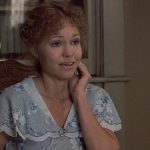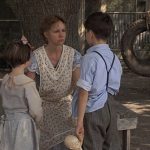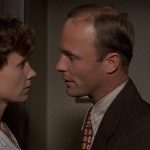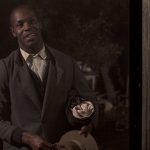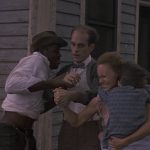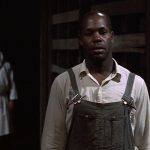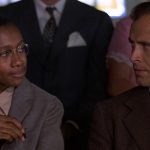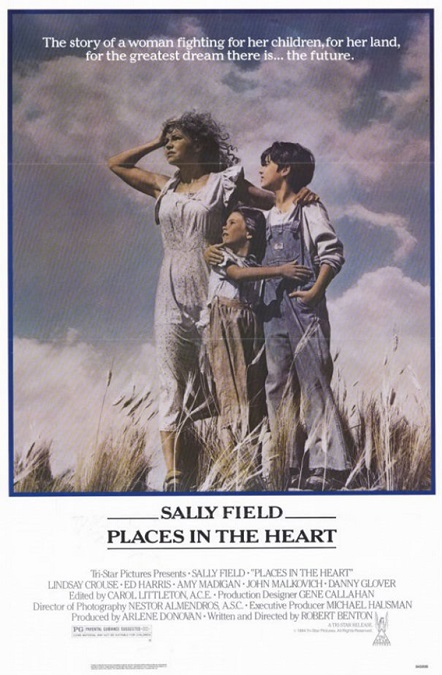
Places in the Heart – 1984
Sally Field won the Academy Award for Best Actress for her role as Edna Spalding, a single mother who must fight and struggle to keep her home and her family after the death of her husband during the Great Depression. And let me tell you, she really deserved it. And to respond to her acceptance speech, I’ll say: Yes, Sally. I liked you. I really liked you!
The movie was a great example of memorable filmmaking. I’ll be honest and confess that I didn’t have high hopes for this movie. The title itself brought up the words ‘chick flick’ in my mind. I went into it knowing nothing except for the names of its main cast. Aside from Sally Field, Danny Glover, John Malkovich, and Ed Harris all turned in some wonderful performances, as did Amy Madigan, a name with which I am not familiar.
Edna’s husband, Royce, played by Ray Baker, is killed by a young black boy who accidentally shoots him, for which he is lynched and murdered. After the funeral, I grieved for the widow as she asks, “What am I going to do now?” She has no job skills, no money, two children to care for, and no help. But she is kind and generous. A black drifter named Moses, played by Glover arrives asking for work. He suggests that if Edna would give him food and a place to stay, he will turn her 30 acre plot of land into a cotton farm. She agrees and the two become friends. Malkovich plays Mr. Will, a blind man who comes to rent a room in Edna’s house. He is self-sufficient, able to earn a living making chairs and brooms. As a blind man, he has the advantage of not being able to see color in a time when racism was the norm. But he also had the disadvantage of not being able to see the simple beauty of a woman’s face.
The three of them, along with Edna’s two children, become a functional household. Edna helps Moses to farm the cotton, and Mr. Will becomes fond of the children. But he is the only one who cannot share the difficult task of picking the cotton. It is torturous labor, but Edna knows it is the only way to save her family, as the bank demands money she does not have. If she cannot pay, the house will be repossessed and her children might have to be sent to live with other relatives.
There are a few subplots, the most interesting of which involves Wayne Lomax, Edna’s brother-in-law, played by Harris, and his wife, Margaret, played by Lindsay Crouse. Wayne is having an affair with the local school teacher, Viola, played by Madigan. The two played their parts well and had a good chemistry together, both when the affair was strong, and after Viola decided to end it.
And the film’s climax was great, too. Edna nearly kills herself harvesting her cotton, but has to be coached by Moses to get a fair price when selling it. The buyer is not simply racist, he is a member of the Ku Klux Klan. Because of his involvement in the sale, they attack Moses in the middle of the night, intending to kill him. But Moses is saved by blind Mr. Will, wielding a gun. He fails to kill any of the attackers but they run when he reveals that he knows their identities by the sound of their voices. Unfortunately, fearing further attacks, Moses quickly decides to leave, giving Edna a teary goodbye.
All of that might indicate that the film was all about Edna’s fight to pay the mortgage on the house and keep her family together. But interestingly enough, the film’s cryptic final scene put more emphasis on the anti-racism theme. After all the hardships are over, Edna and her family are seen in church. As communion is being handed out we see Edna, her kids, and Mr. Will sitting in the pew. But then, as the camera pans back, we see Royce sitting next to her exchanging a look of good will and forgiveness with the young black boy who had killed him. It left me with the message of racial tolerance stronger in my mind than the inspiration of Edna’s triumph of the human spirit.
Either way, the story was compelling and easy to follow. The cinematography was wonderfully executed, especially during the tornado scene. And the costumes were perfectly appropriate, drab and colorless, for the Depression Era. The movie was very well acted by the entire cast, but it was Field who really outshone them all. Her raw emotions were so well played and she really drew me into the story, making me care about what happened. Well done Sally!
